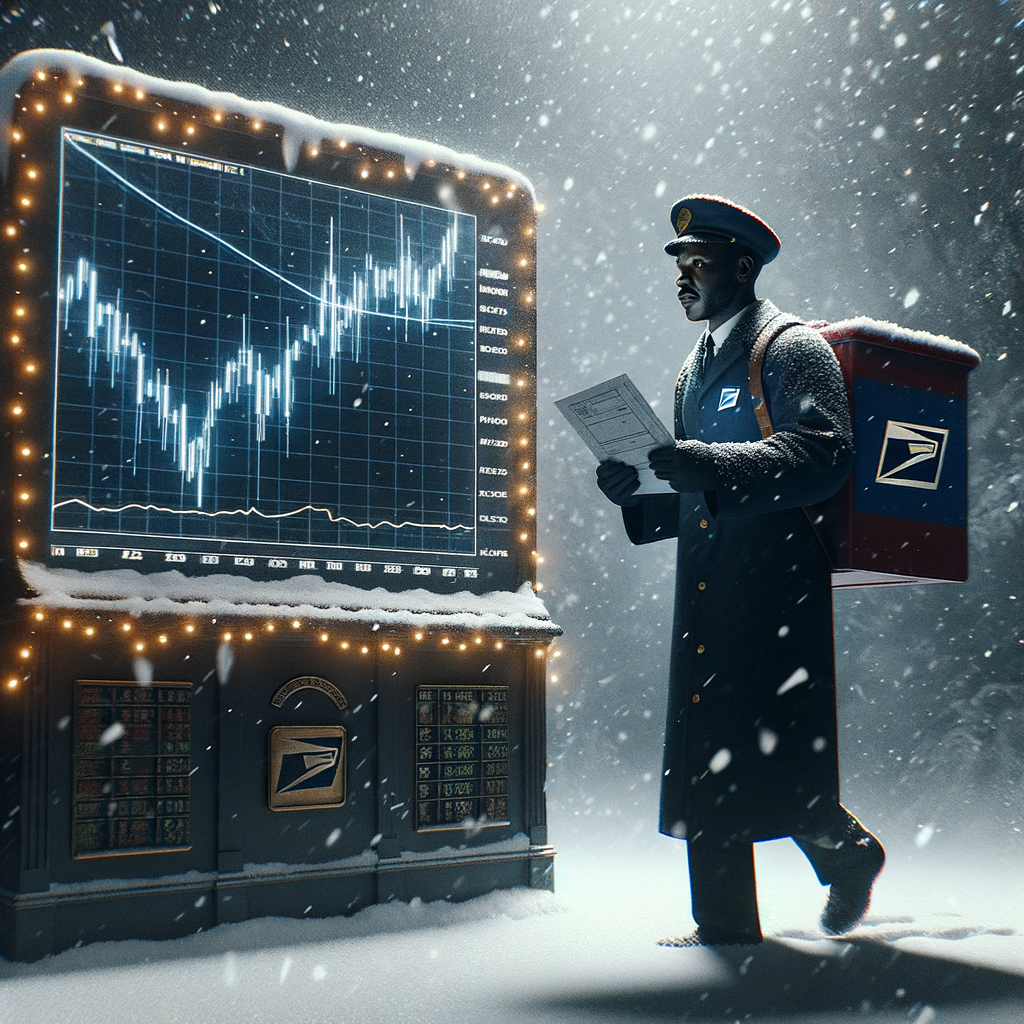Stock Market Trends to Watch on MLK Day
Title: Stock Market and Mail Delivery on MLK Day
As the nation pauses to honor the legacy of civil rights leader Dr. Martin Luther King Jr., investors and traders take a momentary break from the hustle and bustle of the stock market. MLK Day, observed on the third Monday of January, is a federal holiday in the United States, which means the New York Stock Exchange (NYSE) and Nasdaq will be closed, giving market participants a chance to reflect on broader societal trends and the impact of social movements on economic policies.
While the markets take a day off, it’s an opportune time to consider the stock market trends that often emerge around this holiday. Historically, the period leading up to and following MLK Day has been associated with a sense of optimism in the markets. This could be attributed to the ‘January Effect,’ a phenomenon where stock prices tend to rise at the beginning of the year, as investors engage in tax-loss harvesting in December and then reinvest in January.
Moreover, the closure of the stock market on MLK Day provides a pause that can sometimes act as a reset for market sentiment. With traders stepping back, the markets have a chance to stabilize and potentially build momentum for when they reopen. This break can be particularly beneficial following periods of high volatility, allowing for a cooling-off period that might lead to a more measured approach to trading in the days that follow.
In addition to the stock market, MLK Day also affects other sectors, such as mail delivery. The United States Postal Service (USPS) does not operate on federal holidays, which means there will be no regular mail delivery on MLK Day. This pause in service is a reminder of the interconnectedness of various facets of daily life and the economy. While the immediate impact might be minor, the cumulative effect of such holidays throughout the year can influence business operations and consumer behavior.
Despite the temporary closure of the stock market and mail delivery services, MLK Day can serve as a catalyst for reflection on the importance of diversity and inclusion within the financial sector. In recent years, there has been a growing recognition of the need for a more equitable and representative financial industry. This has led to increased support for minority-owned businesses and a push for greater diversity in corporate leadership, which can ultimately lead to more robust and resilient markets.
As we look ahead, the stock market trends on MLK Day and beyond may be shaped by the ongoing push for social justice and equality. Companies that prioritize diversity and have strong corporate social responsibility policies are increasingly appealing to investors, particularly among younger generations who value ethical considerations in their investment choices.
In conclusion, while MLK Day may bring a brief respite from the daily fluctuations of the stock market and a pause in mail delivery, it also offers a moment to consider the broader implications of social change on economic trends. The optimism that often characterizes the markets around this time is a testament to the enduring influence of Dr. King’s vision, one that continues to inspire progress and hope for a more inclusive and prosperous future for all. As we honor his legacy, it’s worth keeping an eye on the evolving trends that reflect our society’s values and the potential for positive change within the world of finance.
Impact of MLK Day on Mail Delivery and Stock Market Operations
Title: Stock Market and Mail Delivery on MLK Day
As the nation pauses to honor the legacy of Dr. Martin Luther King Jr., a day filled with parades, community service, and reflection, there is a noticeable quiet in the hustle and bustle of daily commerce. MLK Day, observed on the third Monday of January, not only commemorates the civil rights leader’s birth but also impacts the operations of two key services: the stock market and mail delivery.
On this federal holiday, the New York Stock Exchange (NYSE) and Nasdaq take a break from the frenetic trading of stocks and bonds. This pause in the financial world is a testament to the importance of recognizing the strides made in equality and justice, a realm where Dr. King’s influence remains profound. Investors and traders alike use this time to step back from their screens, reflecting on the broader societal values that underpin the market’s existence. It’s a day when the relentless pursuit of profit yields to a collective acknowledgment of a greater cause.
Similarly, the United States Postal Service (USPS) suspends its operations, giving its employees a well-deserved rest. No regular mail delivery occurs on MLK Day, allowing postal workers to join in the nationwide observance of Dr. King’s contributions to social change. This break in service is a reminder of the interconnectedness of all sectors of society, and how a day of remembrance can ripple through the fabric of American life.
The impact of MLK Day on these services also offers a moment of respite for the American public. Without the arrival of bills, letters, or the fluctuations of the stock market to consider, individuals are afforded the opportunity to engage more fully with the spirit of the holiday. Communities come together to serve, learn, and grow, embodying the values that Dr. King championed.
Moreover, the temporary cessation of mail and market activities does not dampen the optimism that characterizes American enterprise. On the contrary, it reinforces the resilience and adaptability of these institutions. The stock market, for instance, has historically shown a buoyant return to activity following MLK Day, as if invigorated by the brief hiatus. Investors return to their trades with a renewed sense of purpose, often with fresh perspectives that can lead to more thoughtful and impactful investment decisions.
The postal service, too, resumes its critical role with vigor. The day after MLK Day sees mail carriers and postal workers redoubling their efforts to ensure that the temporary pause has minimal disruption on the timely delivery of correspondence and packages. This swift return to efficiency is a hallmark of the USPS’s commitment to serving the American people, a commitment that mirrors the dedication Dr. King had to public service.
In essence, MLK Day offers a unique convergence of remembrance and reflection that extends beyond individual contemplation to influence major operational sectors like the stock market and mail delivery. It’s a day that underscores the importance of pausing to honor the past while maintaining an optimistic outlook on the resumption of daily life and commerce. As the nation celebrates Dr. King’s enduring legacy, it is clear that his impact is felt not only in the strides toward equality but also in the very rhythm of American society, which can afford to take a breath in his memory and then carry on, inspired and undeterred.







